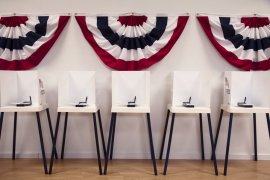What are primary elections?
 Although voter turnout is usually low, primary elections can be more important than the general election in certain states. Photo by Hill Street Studios/Getty Images.
Although voter turnout is usually low, primary elections can be more important than the general election in certain states. Photo by Hill Street Studios/Getty Images.
New Jersey voters head to the polls Tuesday for two critical primary contests that will determine who will be competing in the Oct. 16 general election to find a permanent replacement for the late Sen. Frank Lautenberg, a Democrat.
Each state sets its own laws governing when they’re held, who can vote in them, and how candidates advance to the general election. In some states, primaries are considered to be more important than the general election.
Primaries come in two main categories: partisan and non-partisan.
In a partisan primary, each state holds mini-elections for each major political party before the general election date. Candidates of the same political affiliation face off to determine who will receive the party nod and advance to compete with the candidate of the other major political party in the general election. Who can vote in a partisan primary depends on the law.
There are three types of partisan primaries: open, closed, and semi-closed. Closed primaries are only open to those registered with that party. But some states opted for semi-closed primaries to avoid exclusion of independent voters. In that case, independents are allowed to cast ballots in either party’s primary.
In some states, like Utah, each political party is allowed to choose the type of primary the party will hold, so Republicans hold closed primaries and Democrats hold semi-closed contests. There are a few different variations of this system. In 2011, Idaho passed a law allowing parties to choose preferred primary types, but that requires voters be bound to that party affiliation in the next election. In Arizona where the rules are even stricter, only people pre-registered with a political party are issued a ballot.
In an open primary all voters can select a ballot for any party, regardless of their political registration, but they can only vote in one contest. Most states require that voters be registered with some political party. Open primary supporters argue more people can participate when independent voters are encouraged to cast ballots.
Open primary elections were adopted during the Progressive Movement of the turn of the century because they were seen as a way to put power in the hands of the people. Citizens could choose their candidates for office through a popular vote, rather than leaving the selection of a candidate up to the caucus power of political party bosses.
You might also like









